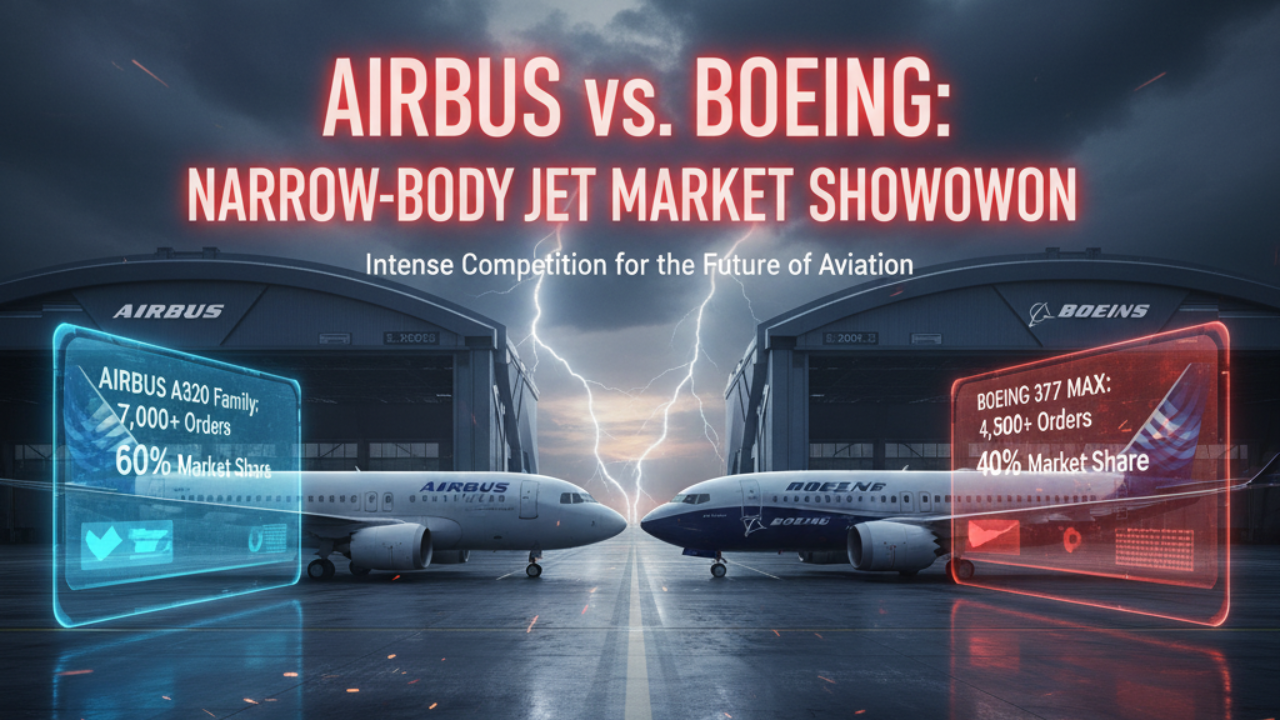
Post by : Shivani
In the trillion-dollar arena of commercial aviation, the narrow-body segment—single-aisle jets seating 100-240 passengers—remains the crown jewel, powering 70% of global flights and 60% of revenues for airlines. As of October 2025, Airbus's A320 family has surged past Boeing's 737 to claim the title of the most-delivered jetliner ever, with 12,260 units against the 737's legacy total. This milestone caps a decade-long battle intensified by Boeing's 737 MAX crises, supply chain snarls, and Airbus's relentless ramp-up to 75 jets per month. With forecasts predicting 34,250 new narrow-body deliveries from 2025-2044 worth $2.5 trillion, the stakes couldn't be higher. This analysis dissects the 2025 showdown: Airbus's 56% market share versus Boeing's 40% fightback, orders, deliveries, innovations, and future trajectories.
Airbus CEO Guillaume Faury declared in Q3 2025: "The A320neo's dominance reflects our focus on efficiency and customer needs—Boeing's recovery is welcome, but the gap is structural." Boeing, rebounding from MAX groundings and quality probes, counters with 737 MAX upgrades and widebody pushes, but narrow-body lag persists. As low-cost carriers like IndiGo and Ryanair fuel demand, this rivalry shapes aviation's post-pandemic boom.
The A320neo (New Engine Option), launched in 2010, revolutionized single-aisles with 15-20% fuel savings via LEAP-1A or PW1100G engines, sharklets, and lighter composites. Variants span A319neo (140 seats), A320neo (180), and A321neo (220), with the XLR extending range to 4,700nm for transatlantic hops. Boeing's 737 MAX, a 2011 response, offers similar efficiencies on the 50-year-old 737 platform, with MAX 7/8/9/10 variants and CFM LEAP-1B engines. Yet, MAX's raised engines and MCAS software drew scrutiny post-2018/2019 crashes, grounding it for 20 months and eroding trust.
Key differentiators:
By September 2025, A320neo boasts 11,256 orders (4,157 delivered), dwarfing MAX's 6,779 (delivered ~3,500).Airbus's 88.9% backlog is narrow-body heavy; Boeing's 74% MAX-focused but plagued by delays.
Airbus dominates 2025 deliveries: 507 jets YTD (Sept) vs Boeing's 440, a 67-jet lead—Airbus's seventh straight annual win. Narrow-body focus: A320neo family ~400 YTD vs 737 MAX ~300. Boeing's September surge (55 deliveries) narrowed the gap but couldn't erase it.
Orders flip: Boeing nets 699 gross YTD vs Airbus's 501, buoyed by Qatar's 210 MAX/787s. Yet, Airbus's backlog (8,678 jets) towers over Boeing's 6,576.
| Metric | Airbus (A320 Family) | Boeing (737 Family) |
|---|---|---|
| Deliveries | ~400 | ~300 |
| Market Share | 56% | 40% |
| Orders (Gross) | 294 (A320neo) | 373 (MAX) |
| Backlog | 7,634 | 4,814 |
| Monthly Rate | 50-63 | 31-42 |
Source: Cirium, OEM reports [](grok_render_citation_card_json={"cardIds":["2f2983","2e19d5"]})
Both face engine woes: Airbus's 40 "gliders" await Safran LEAPs; Boeing grapples with Pratt & Whitney GTF durability. Tier-2 bottlenecks—labor shortages, tariffs—cap Airbus at 63/month vs 75 target; Boeing at 42 vs 50. Geopolitics adds pressure: US-EU tariffs hike costs 5-10%.
Airbus mitigates via AI (Skywise) and diversification (India hubs); Boeing invests $1B in quality. X buzz: "@AviationAnalyst: Airbus's A321XLR is stealing Boeing's lunch—midsize market wide open."
Airbus and Boeing forecast ~43,500 new aircraft 2025-2044, with narrow-bodies at 70% (Airbus: 34,250; Boeing: 33,285). Growth drivers: Asia-Pacific LCC boom (6.5% CAGR), fleet replacement (52%), and sustainability (SAF compatibility). Emerging threats: COMAC C919 (1,005 orders, China-focused). []
Airbus eyes 60% share via A321 dominance; Boeing bets on MAX 10 certification (2026) and NMA revival. Sustainability tilt: Both pledge net-zero 2050, but Airbus leads in hydrogen (ZEROe).
| Region | Deliveries | % of Total |
|---|---|---|
| Asia-Pacific | 14,500 | 42% |
| North America | 8,200 | 24% |
| Europe | 6,100 | 18% |
| Middle East/Africa | 3,450 | 10% |
| Latin America | 2,000 | 6% |
| Total | 34,250 | 100% |
Airbus courts LCCs (IndiGo: 500+ A320s) with A321XLR for "long-narrow" routes; Boeing retains legacies like Southwest (737 exclusive). Geopolitics: Airbus eyes India plant (UP/Gujarat); Boeing leverages US subsidies. X sentiment: "A320neo vs 737 MAX: Airbus winning on efficiency, Boeing on familiarity."
Boeing's MAX woes cost $20B+; Airbus faces A320 delays. Both pivot to green: SAF blends, electric taxis. COMAC's C919 eyes 10% China share by 2030.
2025 cements Airbus's narrow-body throne—56% share, record deliveries—but Boeing's order surge signals resilience. With $3.4T in play by 2044, innovation and supply chains decide the victor. As Faury quips: "It's not a sprint; it's a marathon." Aviation's future? More efficient, connected skies—dominated by these dueling giants.
Track the Rivalry: Follow @Airbus and @BoeingAirplanes on X. Data from Cirium, OEMs.
#AirbusVsBoeing #NarrowBodyShowdown #A320neo #737MAX #A321XLR #Aviation2025 #CommercialAviation #AirbusDominance










Advances in Aerospace Technology and Commercial Aviation Recovery
Insights into breakthrough aerospace technologies and commercial aviation’s recovery amid 2025 chall

Defense Modernization and Strategic Spending Trends
Explore key trends in global defense modernization and strategic military spending shaping 2025 secu

Tens of Thousands Protest in Serbia on Anniversary of Deadly Roof Collapse
Tens of thousands in Novi Sad mark a year since a deadly station roof collapse that killed 16, prote

Canada PM Carney Apologizes to Trump Over Controversial Reagan Anti-Tariff Ad
Canadian PM Mark Carney apologized to President Trump over an Ontario anti-tariff ad quoting Reagan,

The ad that stirred a hornets nest, and made Canadian PM Carney say sorry to Trump
Canadian PM Mark Carney apologizes to US President Trump after a tariff-related ad causes diplomatic

Bengaluru-Mumbai Superfast Train Approved After 30-Year Wait
Railways approves new superfast train connecting Bengaluru and Mumbai, ending a 30-year demand, easi